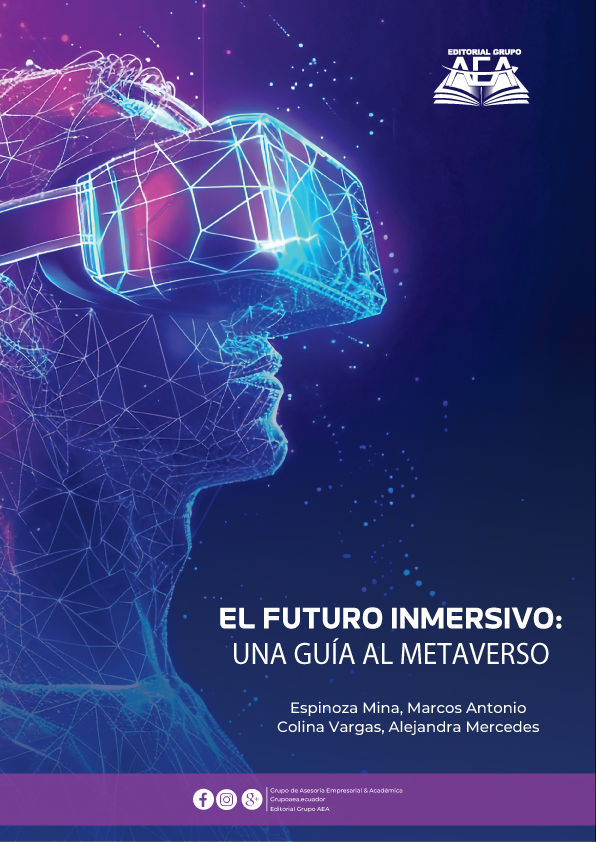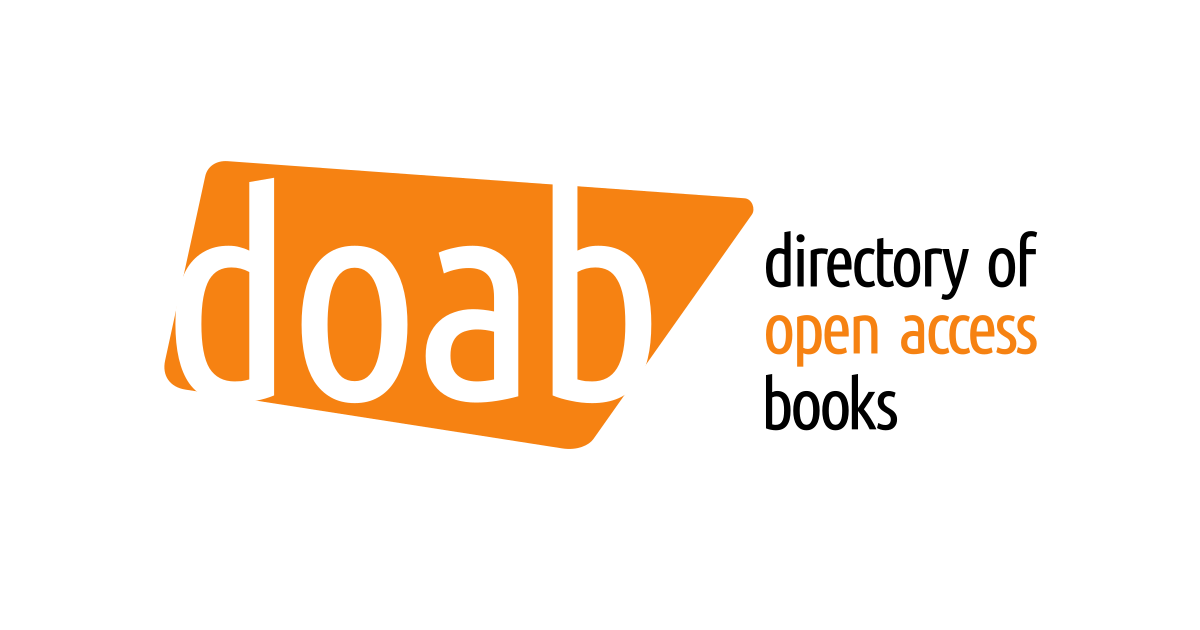El futuro inmersivo: Una guía al Metaverso
Palabras clave:
Metaverso, realidades extendidas, diseño inmersivo, identidad digital, inteligencia artificialSinopsis
El presente texto, basado en una revisión bibliográfica rigurosa de artículos científicos recientes y publicaciones emitidas por organizaciones líderes en tecnología, tiene como propósito ofrecer una comprensión integral y actualizada del fenómeno del metaverso, orientada a estudiantes, investigadores y profesionales de distintas disciplinas. Se aborda el metaverso como una iteración inmersiva, tridimensional y persistente de internet, en estrecha relación con las realidades extendidas (XR), y se analizan los pilares tecnológicos que posibilitan su desarrollo, tales como la conectividad avanzada, la inteligencia artificial, el blockchain, el Internet de las Cosas (IoT) y el hardware especializado. El estudio también profundiza en los principios del diseño inmersivo, destacando su rol en la creación de experiencias significativas a través de la narrativa ambiental, la atmósfera estética y el diseño de niveles. Asimismo, se examinan las herramientas del llamado cartógrafo digital, incluyendo motores gráficos avanzados, plataformas creator-friendly, gestión de assets tridimensionales y los flujos de trabajo propios del desarrollo en entornos virtuales. En conjunto, este análisis ofrece una visión estructurada de los fundamentos, aplicaciones y desafíos del metaverso, con el objetivo de preparar al lector para comprender, diseñar y participar activamente en esta evolución emergente del entorno digital.
Citas
Acheampong, R., Popovici, D.-M., Balan, T., Rekeraho, A., & Ramos, M. S. (2025). Enhancing Security and Authenticity in Immersive Environments. Information, 16(3), 191. https://doi.org/10.3390/info16030191
Adams, J. P. (2024). Qualitative research in the metaverse, a primer. International Journal of Market Research, 66(5), 543-549. https://doi.org/10.1177/14707853241255473
Ahn, D.-K., Bae, B.-C., & Kim, Y. (2023). User Experience of a Digital Fashion Show: Exploring the Effectiveness of Interactivity in Virtual Reality. Applied Sciences, 13(4), 2558. https://doi.org/10.3390/app13042558
Aldweesh, A., Alauthman, M., Al Khaldy, M., Ishtaiwi, A., al-Qerem, A., Almoman, A., & Gupta, B. B. (2023). The Meta-Fusion: A Cloud-Integrated Study on Blockchain Technology Enabling Secure and Efficient Virtual Worlds. International Journal of Cloud Applications and Computing, 13(1), 1-24. https://doi.org/10.4018/IJCAC.331752
Arya, V., Sambyal, R., Sharma, A., & Dwivedi, Y. K. (2024). Brands are calling your AVATAR in Metaverse–A study to explore XR ‐based gamification marketing activities & consumer‐based brand equity in virtual world. Journal of Consumer Behaviour, 23(2), 556-585. https://doi.org/10.1002/cb.2214
Badilla-Quintana, M. G., & Sandoval-Henríquez, F. J. (2021). Students’ Immersive Experience in Initial Teacher Training in a Virtual World to Promote Sustainable Education: Interactivity, Presence, and Flow. Sustainability, 13(22), 12780. https://doi.org/10.3390/su132212780
Bag, S., Rahman, M. S., Srivastava, G., & Shrivastav, S. K. (2023). Unveiling metaverse potential in supply chain management and overcoming implementation challenges: An empirical study. Benchmarking: An International Journal, 32(11), 79-108. https://doi.org/10.1108/BIJ-05-2023-0314
Baker, J., Nam, K., & Dutt, C. S. (2023). A user experience perspective on heritage tourism in the metaverse: Empirical evidence and design dilemmas for VR. Information Technology & Tourism, 25(3), 265-306. https://doi.org/10.1007/s40558-023-00256-x
Bansal, G., Rajgopal, K., Chamola, V., Xiong, Z., & Niyato, D. (2022). Healthcare in Metaverse: A Survey on Current Metaverse Applications in Healthcare. IEEE Access, 10, 119914-119946. https://doi.org/10.1109/access.2022.3219845
Baptista Oliveira Souza, L., Celeste Santana Cunha, A., Monteiro Xavier De Lima, M., & Enéas Peres Ricca, D. (2023). Pragmatic and hedonic aspects of user experience in Virtual Reality: Analysis of novice users’ information mediation during their first interaction with a Metaverse platform. InfoDesign - Revista Brasileira de Design Da Informação, 20(3). https://doi.org/10.51358/id.v20i3.1068
Bernaschina, D. (2023). Art gamification (and digital/media arts) for special school: New thinking shifts for inclusive metaverse’s engineering. Metaverse, 5(1), 2274. https://doi.org/10.54517/m.v5i1.2274
Bhattacharya, P., Saraswat, D., Savaliya, D., Sanghavi, S., Verma, A., Sakariya, V., Tanwar, S., Sharma, R., Raboaca, M. S., & Manea, D. L. (2023). Towards Future Internet: The Metaverse Perspective for Diverse Industrial Applications. Mathematics, 11(4), 941. https://doi.org/10.3390/math11040941
Bibri, S. E., Allam, Z., & Krogstie, J. (2022). The Metaverse as a virtual form of data-driven smart urbanism: Platformization and its underlying processes, institutional dimensions, and disruptive impacts. Computational Urban Science, 2(1), 24. https://doi.org/10.1007/s43762-022-00051-0
Bonenkamp, V. (2025, julio 2). Top 10 Metaverse Startups in 2025: Best Innovators to Watch. https://www.femaleswitch.com/startup-blog-2025/tpost/1nhndnigg1-top-10-metaverse-startups-in-2025-best-i
Boopathy, P., Deepa, N., Maddikunta, P. K. R., Victor, N., Gadekallu, T. R., Yenduri, G., Wang, W., Pham, Q.-V., Huynh-The, T., & Liyanage, M. (2025). The Metaverse for Industry 5.0 in NextG Communications: Potential Applications and Future Challenges. IEEE Open Journal of the Computer Society, 6, 4-24. https://doi.org/10.1109/OJCS.2024.3497335
Buchholz, F., Oppermann, L., & Prinz, W. (2022). There’s more than one metaverse. I-Com, 21(3), 313-324. https://doi.org/10.1515/icom-2022-0034
Campos, T., Castello, M., Damasceno, E., & Valentim, N. (2025). An Updated Systematic Mapping Study on Usability and User Experience Evaluation of Touchable Holographic Solutions. Journal on Interactive Systems, 16(1), 172-198. https://doi.org/10.5753/jis.2025.4694
Cartlidge, J. (2024). Non-Perceptual Representational Immersion in Video Games: A Response to David Chalmers’ Reality+. Philosophy & Technology, 37(3). https://doi.org/10.1007/s13347-024-00767-3
Chinie, C., Oancea, M., & Todea, S. (2022). The adoption of the metaverse concepts in Romania. Management & Marketing, 17(3), 328-340. https://doi.org/10.2478/mmcks-2022-0018
Choi, S., Yoon, K., Kim, M., Yoo, J., Lee, B., Song, I., & Woo, J. (2022). Building Korean DMZ Metaverse Using a Web-Based Metaverse Platform. Applied Sciences, 12(15), 7908. https://doi.org/10.3390/app12157908
Crespo-Pereira, V., Sánchez-Amboage, E., & Membiela-Pollán, M. (2023). Facing the challenges of metaverse: A systematic literature review from Social Sciences and Marketing and Communication. El Profesional de La Información, e320102. https://doi.org/10.3145/epi.2023.ene.02
Cruz Vázquez, J. A., Ruiz Ledesma, E. F., & Chavarría Báez, L. (2022). Virtual worlds in distance learning. International Journal of Evaluation and Research in Education (IJERE), 11(2), 907. https://doi.org/10.11591/ijere.v11i2.21752
Cruz, A., Paredes, H., Morgado, L., & Martins, P. (2021). Non-verbal Aspects of Collaboration in Virtual Worlds: A CSCW Taxonomy-development Proposal Integrating the Presence Dimension. JUCS - Journal of Universal Computer Science, 27(9), 913-954. https://doi.org/10.3897/jucs.74166
Cruz, M., & Oliveira, A. (2024). Unravelling Virtual Realities—Gamers’ Perceptions of the Metaverse. Electronics, 13(13), 2491. https://doi.org/10.3390/electronics13132491
Cruz, M., Oliveira, A., & Pinheiro, A. (2024). Faraway, so Close: Perceptions of the Metaverse on the Edge of Madness. Computers, 13(1), 19. https://doi.org/10.3390/computers13010019
Darshan S. (2024, octubre 26). The Future of UX in the Metaverse and AR/VR: Redefining User Experience in Immersive Environments. LinkedIn. https://www.linkedin.com/pulse/future-ux-metaverse-arvr-redefining-user-experience-immersive-s-j5osc
Dastan, M., Ricci, M., Vangi, F., & Fiorentino, M. (2024). Enhancing Well-Being: A Comparative Study of Virtual Reality Chromotherapy Rooms with Static, Dynamic, and Empty Environments. Sensors, 24(6), 1732. https://doi.org/10.3390/s24061732
Du, Y., Grace, T. D., Jagannath, K., & Salen-Tekinbas, K. (2021). Connected Play in Virtual Worlds: Communication and Control Mechanisms in Virtual Worlds for Children and Adolescents. Multimodal Technologies and Interaction, 5(5), 27. https://doi.org/10.3390/mti5050027
Fadhel, M. A., Duhaim, A. M., Albahri, A. S., Al-Qaysi, Z. T., Aktham, M. A., Chyad, M. A., Abd-Alaziz, W., Albahri, O. S., Alamoodi, A. H., Alzubaidi, L., Gupta, A., & Gu, Y. (2024). Navigating the metaverse: Unraveling the impact of artificial intelligence—a comprehensive review and gap analysis. Artificial Intelligence Review, 57(10), 264. https://doi.org/10.1007/s10462-024-10881-5
Farhi, F. (2024). Examining the factors fostering metaverse experience browser acceptance under unified theory of acceptance and use of technology (UTAUT). Journal of Infrastructure, Policy and Development, 8(3), 2594. https://doi.org/10.24294/jipd.v8i3.2594
Farooq, M. S., Ishaq, K., Shoaib, M., Khelifi, A., & Atal, Z. (2023). The Potential of Metaverse Fundamentals, Technologies, and Applications: A Systematic Literature Review. IEEE Access, 11, 138472-138487. https://doi.org/10.1109/access.2023.3338627
FINPR Agency FZCO. (2025, enero 31). 9 Best Metaverse Projects in 2025: Best Virtual Worlds to Explore. FINPR Agency. https://finpr.agency/tpost/6oumvv2k81-9-best-metaverse-projects-in-2025-virtua
Gruson, D., Greaves, R., Dabla, P., Bernardini, S., Gouget, B., & Öz, T. K. (2023). A new door to a different world: Opportunities from the metaverse and the raise of meta-medical laboratories. Clinical Chemistry and Laboratory Medicine (CCLM), 61(9), 1567-1571. https://doi.org/10.1515/cclm-2023-0108
Guan, J., Liu, J., & Morris, A. (2024). Design Frameworks for Spatial Zone Agents in XRI Metaverse Smart Environments (No. arXiv:2401.11040v1). arXiv. https://arxiv.org/html/2401.11040v1
Hanneke, B., Heß, M., & Hinz, O. (2025). Foundations of Decentralized Metaverse Economies: Converging Physical and Virtual Realities. Journal of Management Information Systems, 42(1), 238-272. https://doi.org/10.1080/07421222.2025.2452017
Harada, Y., & Ohyama, J. (2022). Quantitative evaluation of visual guidance effects for 360-degree directions. Virtual Reality, 26(2), 759-770. https://doi.org/10.1007/s10055-021-00574-7
Hasgül, E., Karataş, M., Pak Güre, M. D., & Duyan, V. (2023). A perspective from Turkey on construction of the new digital world: Analysis of emotions and future expectations regarding Metaverse on Twitter. Humanities and Social Sciences Communications, 10(1), 484. https://doi.org/10.1057/s41599-023-01958-7
Hennig-Thurau, T., Aliman, D. N., Herting, A. M., Cziehso, G. P., Linder, M., & Kübler, R. V. (2023). Social interactions in the metaverse: Framework, initial evidence, and research roadmap. Journal of the Academy of Marketing Science, 51(4), 889-913. https://doi.org/10.1007/s11747-022-00908-0
Henz, P. (2022). The psychological impact of the Metaverse. Discover Psychology, 2(1), 47. https://doi.org/10.1007/s44202-022-00061-3
Hoffmann, M. (2022). The Ontological Role of Applied Mathematics in Virtual Worlds. Philosophies, 7(1), 22. https://doi.org/10.3390/philosophies7010022
Huynh-The, T., Gadekallu, T. R., Wang, W., Yenduri, G., Ranaweera, P., Pham, Q.-V., Da Costa, D. B., & Liyanage, M. (2023). Blockchain for the metaverse: A Review. Future Generation Computer Systems, 143, 401-419. https://doi.org/10.1016/j.future.2023.02.008
Jacobides, M. G., Candelon, F., Krayer, L., Round, K., & Chen, W. (2024). Building synthetic worlds: Lessons from the excessive infatuation and oversold disillusionment with the metaverse. Industry and Innovation, 31(1), 105-129. https://doi.org/10.1080/13662716.2023.2279051
Jagatheesaperumal, S. K., Ahmad, K., Al-Fuqaha, A., & Qadir, J. (2024). Advancing Education Through Extended Reality and Internet of Everything Enabled Metaverses: Applications, Challenges, and Open Issues. IEEE Transactions on Learning Technologies, 17, 1120-1139. https://doi.org/10.1109/TLT.2024.3358859
Johri, A., Sayal, A., N, C., Jha, J., Aggarwal, N., Pawar, D., Gupta, V., & Gupta, A. (2024). Crafting the techno-functional blocks for Metaverse—A review and research agenda. International Journal of Information Management Data Insights, 4(1), 100213. https://doi.org/10.1016/j.jjimei.2024.100213
Jovanović, A., & Milosavljević, A. (2022). VoRtex Metaverse Platform for Gamified Collaborative Learning. Electronics, 11(3), 317. https://doi.org/10.3390/electronics11030317
Kaarlela, T., Pitkäaho, T., Pieskä, S., Padrão, P., Bobadilla, L., Tikanmäki, M., Haavisto, T., Blanco Bataller, V., Laivuori, N., & Luimula, M. (2023). Towards Metaverse: Utilizing Extended Reality and Digital Twins to Control Robotic Systems. Actuators, 12(6), 219. https://doi.org/10.3390/act12060219
Kara, P. A., Tamboli, R. R., Adhikarla, V. K., Balogh, T., Guindy, M., & Simon, A. (2023). Connected without disconnection: Overview of light field metaverse applications and their quality of experience. Displays, 78, 102430. https://doi.org/10.1016/j.displa.2023.102430
Kim, M., Oh, J., Son, S., Park, Y., Kim, J., & Park, Y. (2023). Secure and Privacy-Preserving Authentication Scheme Using Decentralized Identifier in Metaverse Environment. Electronics, 12(19), 4073. https://doi.org/10.3390/electronics12194073
Ko, C., & Kim, S. (2024). Adolescent Female Users’ Avatar Creation in Social Virtual Worlds: Opportunities and Challenges. Behavioral Sciences, 14(7), 539. https://doi.org/10.3390/bs14070539
Krauss, D. (2023, marzo 7). Making the metaverse feel real: The key characteristics and challenges. https://www.ciena.com/insights/articles/2023/making-the-metaverse-feel-real-the-key-characteristics-and-challenges
Kudry, P., & Cohen, M. (2023). Enhanced Wearable Force-Feedback Mechanism for Free-Range Haptic Experience Extended by Pass-Through Mixed Reality. Electronics, 12(17), 3659. https://doi.org/10.3390/electronics12173659
Kumar, S., Sureka, R., Lucey, B. M., Dowling, M., Vigne, S., & Lim, W. M. (2024). MetaMoney: Exploring the intersection of financial systems and virtual worlds. Research in International Business and Finance, 68, 102195. https://doi.org/10.1016/j.ribaf.2023.102195
Laine, T. H., & Suk, H. J. (2024). Investigating User Experience of an Immersive Virtual Reality Simulation Based on a Gesture-Based User Interface. Applied Sciences, 14(11), 4935. https://doi.org/10.3390/app14114935
Lannier, S. (2024). Infiltrating virtual worlds. The regulation of undercover agents through fundamental rights. Revista Brasileira de Direito Processual Penal, 10(3). https://doi.org/10.22197/rbdpp.v10i3.1066
Lee, J. (2022). A study on the intention and experience of using the metaverse. JAHR, 13(1), 177-192. https://doi.org/10.21860/j.13.1.10
López Solórzano, J. G., Ángel Rueda, C. J., & Vergara Villegas, O. O. (2024). Measuring Undergraduates’ Motivation Levels When Learning to Program in Virtual Worlds. Computers, 13(8), 188. https://doi.org/10.3390/computers13080188
Machinations Metaverse. (2025). User generated content in the Metaverse. https://machinations.io/articles/user-generated-content-in-the-metaverse
Maier, F., & Weinberger, M. (2024). Metaverse Meets Smart Cities—Applications, Benefits, and Challenges. Future Internet, 16(4), 126. https://doi.org/10.3390/fi16040126
Martini, M. (2025). Materializing corporate futures: How the EU navigated the Metaverse hype. Information, Communication & Society, 28(5), 852-869. https://doi.org/10.1080/1369118x.2024.2428331
McCall, C., Schofield, G., Halgarth, D., Blyth, G., Laycock, A., & Palombo, D. J. (2022). The underwood project: A virtual environment for eliciting ambiguous threat. Behavior Research Methods, 55(8), 4002-4017. https://doi.org/10.3758/s13428-022-02002-3
McStay, A. (2023). The Metaverse: Surveillant Physics, Virtual Realist Governance, and the Missing Commons. Philosophy & Technology, 36(1), 13. https://doi.org/10.1007/s13347-023-00613-y
Mitsuhara, H. (2024). Metaverse-Based Evacuation Training: Design, Implementation, and Experiment Focusing on Earthquake Evacuation. Multimodal Technologies and Interaction, 8(12), 112. https://doi.org/10.3390/mti8120112
Mohamed, A., & Faisal, R. (2024). Exploring metaverse-enabled innovation in banking: Leveraging NFTS, blockchain, and smart contracts for transformative business opportunities. International Journal of Data and Network Science, 8(1), 35-44. https://doi.org/10.5267/j.ijdns.2023.10.020
Momtaz, P. P. (2022). Some Very Simple Economics of Web3 and the Metaverse. FinTech, 1(3), 225-234. https://doi.org/10.3390/fintech1030018
Mørch, A. I., Andersen, R., Eie, S., & Mifsud, L. (2024). Emergent group understanding: Investigating intersubjectivity in sociotechnical interdependencies. International Journal of Computer-Supported Collaborative Learning, 19(4), 401-431. https://doi.org/10.1007/s11412-024-09432-5
Muresan, A., Mcintosh, J., & Hornbæk, K. (2023). Using Feedforward to Reveal Interaction Possibilities in Virtual Reality. ACM Transactions on Computer-Human Interaction, 30(6), 1-47. https://doi.org/10.1145/3603623
Nateghi̇, A., & Mosharraf, M. (2023). Architecting the Future: A Model for Enterprise Integration in the Metaverse. Journal of Metaverse, 3(2), 190-199. https://doi.org/10.57019/jmv.1355500
Papadopoulos, T., Evangelidis, K., Kaskalis, T. H., & Evangelidis, G. (2025). The Metaverse Is Geospatial: A System Model Architecture Integrating Spatial Computing, Digital Twins, and Virtual Worlds. ISPRS International Journal of Geo-Information, 14(3), 126. https://doi.org/10.3390/ijgi14030126
Pervez, F., Shoukat, M., Usama, M., Sandhu, M., Latif, S., & Qadir, J. (2024). Affective Computing and the Road to an Emotionally Intelligent Metaverse. IEEE Open Journal of the Computer Society, 5, 195-214. https://doi.org/10.1109/OJCS.2024.3389462
Polyviou, A., & Pappas, I. O. (2023). Chasing Metaverses: Reflecting on Existing Literature to Understand the Business Value of Metaverses. Information Systems Frontiers, 25(6), 2417-2438. https://doi.org/10.1007/s10796-022-10364-4
ProApp - Learn Design. (2023, septiembre 6). Spatial UI vs. Traditional UI: Key Differences and Considerations. LinkedIn. https://www.linkedin.com/pulse/spatial-ui-vs-traditional-key-differences-considerations
Rahman, M. H., Sejan, M. A. S., Aziz, M. A., Kim, D.-S., You, Y.-H., & Song, H.-K. (2023). Spectral Efficiency Analysis for IRS-Assisted MISO Wireless Communication: A Metaverse Scenario Proposal. Mathematics, 11(14), 3181. https://doi.org/10.3390/math11143181
Rall, H., Weber, W., & Harper, E. (2024). Animation in immersive environments: Expanding theories of authenticity in educational, historical, and political contexts. Con A de animación, 18, 108-133. https://doi.org/10.4995/caa.2024.20603
Randieri, C. (2023, septiembre 18). The Metaverse: Shaping The Future Of The Internet And Business Through AI Integration. Forbes Technology Council (Forbes). https://www.forbes.com/councils/forbestechcouncil/2023/09/18/the-metaverse-shaping-the-future-of-the-internet-and-business-through-ai-integration/
Red Apple Technologies. (2025, mayo 12). Unity vs Unreal – Which game engine is better in 2025? Red Apple Tech. https://www.redappletech.com/blog/unity-vs-unreal
Rodriguez-Florido, M. Á., Reyes-Cabrera, J. J., Melián, A., Hernández-Flores, C. N., Ruiz-Azola, J., & Maynar, M. (2024). Feasibility of teaching and assessing medical students in the metaverse: Design and features for its learning efficiency. Journal of New Approaches in Educational Research, 13(1). https://doi.org/10.1007/s44322-024-00009-6
Ruiu, P., Nitti, M., Pilloni, V., Cadoni, M., Grosso, E., & Fadda, M. (2024). Metaverse & Human Digital Twin: Digital Identity, Biometrics, and Privacy in the Future Virtual Worlds. Multimodal Technologies and Interaction, 8(6), 48. https://doi.org/10.3390/mti8060048
Samarnggoon, K., Grudpan, S., Wongta, N., & Klaynak, K. (2023). Developing a Virtual World for an Open-House Event: A Metaverse Approach. Future Internet, 15(4), 124. https://doi.org/10.3390/fi15040124
Sharma, A., & Sharma, B. K. (2024). Will Metaverse Face Failure in Future Like Nfts: An Empirical Study. Journal of Logistics, Informatics and Service Science, 11(3). https://doi.org/10.33168/JLISS.2024.0313
Sheka, E. F. (2024). Metaverse and virtual worlds of science. Radioelectronics. Nanosystems. Information Technologies., 16(7), 913-916. https://doi.org/10.17725/j.rensit.2024.16.913
Shepherd, I. (2024, abril 29). AI Powered Teens Are Building the Future in This Virtual World. Forbes. https://www.forbes.com/sites/ianshepherd/2024/04/29/ai-powered-teens-are-building-the-future-in-this-virtual-world/
Singla, A., Gupta, N., Aeron, P., Jain, A., Garg, R., Sharma, D., Gupta, B. B., & Arya, V. (2023). Building the Metaverse: Design Considerations, Socio-Technical Elements, and Future Research Directions of Metaverse. Journal of Global Information Management, 31(2), 1-28. https://doi.org/10.4018/JGIM.321755
Truong, V. T., Le, L., & Niyato, D. (2023). Blockchain Meets Metaverse and Digital Asset Management: A Comprehensive Survey. IEEE Access, 11, 26258-26288. https://doi.org/10.1109/ACCESS.2023.3257029
Urech, A., Meier, P. V., Gut, S., Duchene, P., & Christ, O. (2024). Mapping or no Mapping: The Influence of Controller Interaction Design in an Immersive Virtual Reality Tutorial in Two Different Age Groups. Multimodal Technologies and Interaction, 8(7), 59. https://doi.org/10.3390/mti8070059
Vertakova, Yu., & Shkarupeta, E. (2025). Strategic Management of the Metaverse Ecosystem in the Context of Web 3.0: Theory, Framework and Tools. Review of Business and Economics Studies, 12(4), 29-41. https://doi.org/10.26794/2308-944X-2024-12-4-29-41
Walcott, D. (2023, de diciembre de). AI Has Won 2023, Will The Metaverse Win 2024?
Weinberger, M. (2022). What Is Metaverse?—A Definition Based on Qualitative Meta-Synthesis. Future Internet, 14(11), 310. https://doi.org/10.3390/fi14110310
Yang, L. (2024). Metaverse Identity: Core Principles and Critical Challenges. https://www.econstor.eu/bitstream/10419/302504/1/ITS-Seoul-2024-paper-092.pdf
Yang, Q., Zhao, Y., Huang, H., Xiong, Z., Kang, J., & Zheng, Z. (2022). Fusing Blockchain and AI With Metaverse: A Survey. IEEE Open Journal of the Computer Society, 3, 122-136. https://doi.org/10.1109/OJCS.2022.3188249
Yelzkiz. (2025, marzo 24). Unreal Engine Vs Unity: Which 3D Game Engine Is Best? Yelzkizi. https://yelzkizi.org/unreal-engine-vs-unity/
Yıldırım, P., & Keçeci, G. (2024). Metaverse ve Eğitim: Yeni Bir Dönem Başlıyor! Milli Eğitim Dergisi, 53(243), 1635-1654. https://doi.org/10.37669/milliegitim.1240070
Zarraonandia, T., Díaz, P., Aedo, I., & Bellucci, A. (2022). Engaging educators in the ideation of scenarios for cross-reality game-based learning experiences. Multimedia Tools and Applications, 83(15), 46507-46529. https://doi.org/10.1007/s11042-022-13632-2
Descargas
Próximamente
Licencia
Esta obra está bajo una licencia internacional Creative Commons Atribución-NoComercial-CompartirIgual 4.0.


























